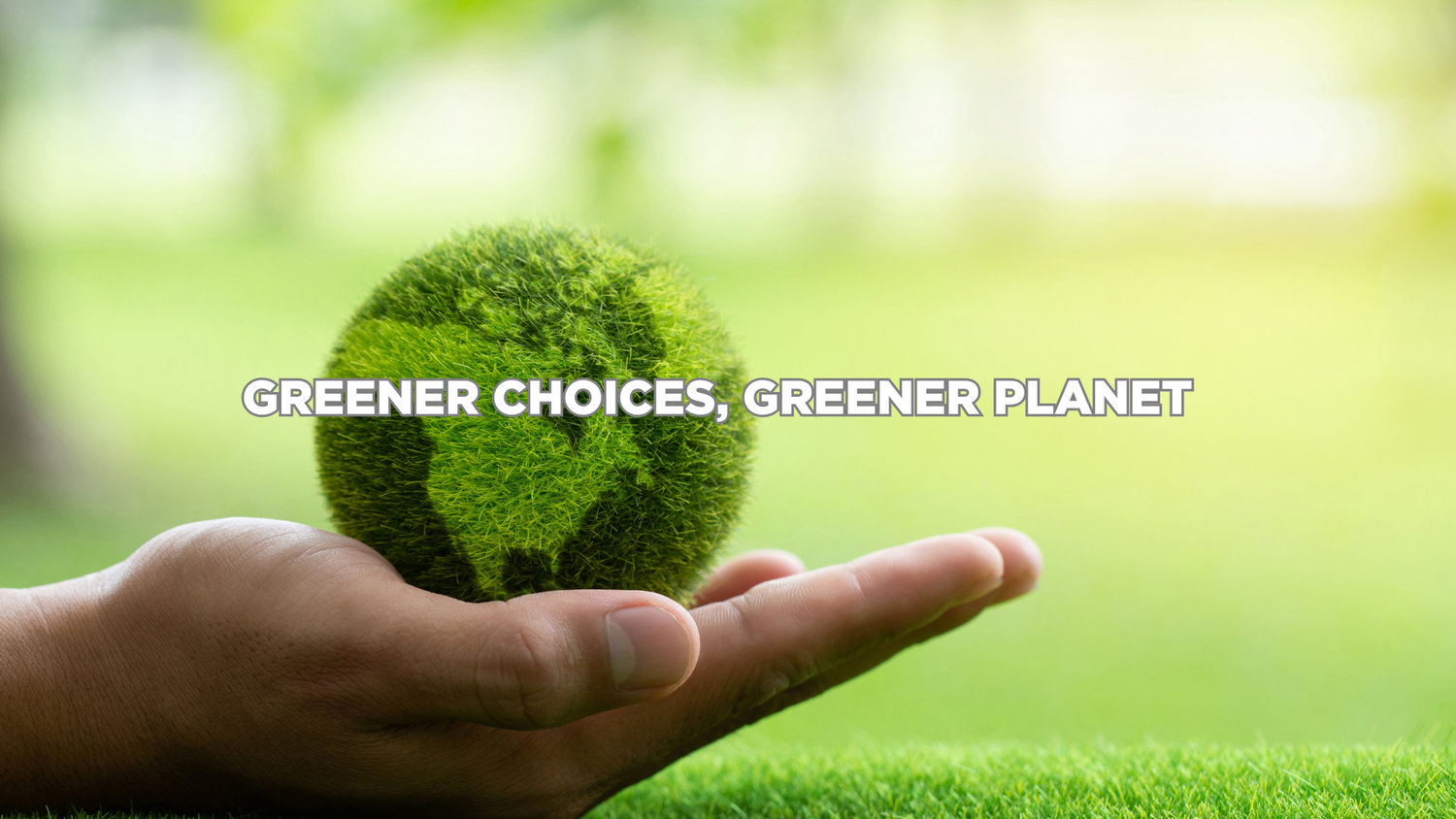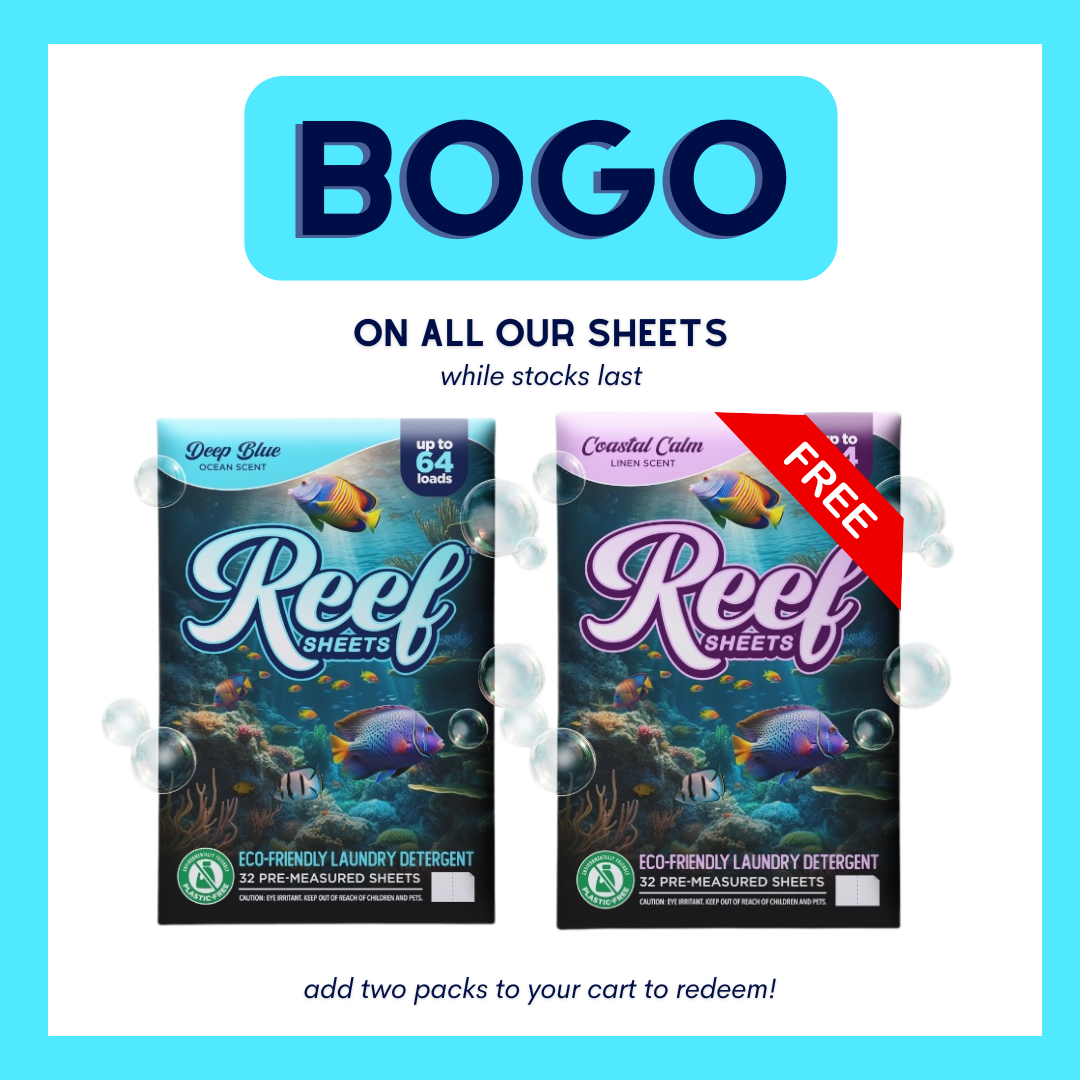Posted on September 30, 2025
At ReefSheets.net, we're passionate about creating laundry solutions that clean effectively while protecting our oceans and your well-being. Our Reef Sheets are innovative, dissolvable laundry sheets designed to minimize environmental impact—especially on fragile coral reefs—without compromising on performance. Today, we're breaking down our ingredient list to highlight which components are plant-based, explain how the formula supports sensitive skin, and compare it to harsher chemicals found in traditional detergents like Tide. If you're seeking a gentler, greener clean, this deep dive will show you why Reef Sheets stand out.
Our full ingredient list: Water, Sodium Dodecyl Sulphate, Polyvinyl Alcohol, Glycerin, Trisodium Citrate, Alcohols C12-14 Ethoxylated, Glyceryl Cocoate, Cocamidopropyl Betaine, Lauryl Glucoside, PEG-12 Dimethicone, Saponins, Benzothiazolinone, Sodium Carbonate.
Plant-Based Power: Nature-Derived Ingredients for Effective Cleaning
We prioritize sustainable sourcing, drawing from natural origins wherever possible to reduce reliance on petroleum-based synthetics. Here's a breakdown of our ingredients, identifying those that are plant-based (derived from renewable sources like coconut, corn, or other botanicals):
-
Glycerin: Plant-based (vegetable-derived). This humectant comes from sources like coconut or soy, helping to dissolve and stabilize the formula while adding moisture.
-
Trisodium Citrate: Plant-based. Sourced from citric acid in fruits like lemons, it acts as a water softener and pH adjuster.
-
Alcohols, C12-14, Ethoxylated: Often plant-based (from coconut or palm oils). These fatty alcohols serve as non-ionic surfactants, breaking down oils and stains gently.
-
Glyceryl Cocoate: Plant-based. Derived from coconut oil, it enhances foaming and emulsifies dirt for easy removal.
-
Cocamidopropyl Betaine: Plant-based. Made from coconut oil, this mild surfactant creates lather and binds to grime without harshness.
-
Lauryl Glucoside: Plant-based. From coconut oil and glucose (corn-derived), it's a gentle cleanser ideal for eco-formulas.
-
Saponins: Plant-based. Naturally extracted from plants like quillaja bark or soapnuts, they provide natural foaming and cleaning action.
-
Sodium Dodecyl Sulphate (SDS): Can be plant-based (from coconut oil in our formula). This surfactant tackles tough stains but is used in balanced amounts for mildness.
The remaining ingredients are either naturally occurring or synthetic for stability:
-
Water: Neutral base, not plant-based.
-
Polyvinyl Alcohol: Synthetic (water-soluble film that dissolves completely).
-
PEG-12 Dimethicone: Synthetic silicone for smoothness.
-
Benzothiazolinone: Synthetic preservative to prevent microbial growth.
-
Sodium Carbonate: Mineral-derived (soda ash), boosts alkalinity for better cleaning.
Over 60% of our active cleaning agents are plant-based, making Reef Sheets a biodegradable alternative that supports ocean health by avoiding persistent synthetics that harm marine life.
Gentle on Sensitive Skin: A Formula Designed for Comfort
Sensitive skin demands ingredients that clean without irritation, and Reef Sheets deliver with a focus on mild, hypoallergenic components. Traditional detergents often leave residues that can trigger dryness, itching, or eczema, but our blend minimizes this risk. Here's how key ingredients contribute:
-
Mild Surfactants Like Cocamidopropyl Betaine and Lauryl Glucoside: These coconut-derived agents are favorites in sensitive-skin formulas. They foam gently, remove dirt effectively, and score low on irritation scales (often used in baby products). Unlike harsher options, they don't strip natural oils, reducing the chance of dermatitis.
-
Glycerin: Acts as a skin softener, drawing moisture to fabrics and preventing dryness during wear. It's non-comedogenic and soothing, ideal for those with eczema or allergies.
-
Saponins and Alcohols C12-14 Ethoxylated: Natural and linear (biodegradable) surfactants that clean without aggressive scrubbing. They break surface tension softly, avoiding the redness or hives linked to stronger chemicals.
-
Trisodium Citrate and Sodium Carbonate: These pH balancers create a neutral environment, preventing alkaline burns or imbalances that irritate sensitive skin.
-
Low-Irritant Profile Overall: We avoid common allergens like dyes and synthetic fragrances. Even SDS, often criticized for potential irritation, is plant-derived and used sparingly here—combined with buffering agents like glycerin to mitigate dryness. The dissolvable sheet format ensures no residue buildup, and independent tests show our formula rates "low concern" for skin sensitivity on databases like EWG.
For users with sensitive skin, Reef Sheets reduce exposure to triggers, promoting comfort without sacrificing cleanliness. Many customers report fewer rashes compared to liquid or pod alternatives.
Comparing to Traditional Detergents: Why Reef Sheets Are Better
Traditional brands like Tide excel at stain removal but often rely on harsh chemicals that harm health, skin, and the environment. Let's compare key offenders in Tide (based on public ingredient disclosures and studies) to our cleaner approach:
|
Harsh Chemical in Tide |
Effects |
Reef Sheets Alternative |
Why It's Better |
|---|---|---|---|
|
1,4-Dioxane (trace contaminant from ethoxylated surfactants) |
Carcinogen and neurotoxin; pollutes water and may cause organ damage with prolonged exposure. |
Minimal or none (we use low-ethoxylation plant-based options and test for traces). |
Avoids cancer risks and reef-damaging pollution; our biodegradable surfactants break down safely. |
|
Synthetic Fragrances (phthalates) |
Endocrine disruptors; trigger allergies, headaches, and respiratory issues; linked to reproductive harm. |
None—fragrance-free. |
Prevents skin irritation and hormone disruption; safer for families and marine ecosystems. |
|
Optical Brighteners |
Skin irritants; non-biodegradable, accumulate in waterways causing algae blooms and fish toxicity. |
None—natural brightening from enzymes and minerals. |
No false "whitening" illusion; reduces environmental harm and allergy risks. |
|
Phosphates |
Cause eutrophication (oxygen-depleting algae growth in oceans); skin dryness. |
None—use citrates instead. |
Protects reefs from nutrient overload; gentler on skin without drying effects. |
|
Chlorine Bleach or Dyes |
Respiratory irritants; bleach burns skin, dyes cause rashes; toxic to aquatic life. |
None—rely on plant-based cleaners. |
Safer breathing and wearing; prevents coral bleaching from chemical runoff. |
Tide's formula, while effective, exposes users to these toxins through skin absorption and inhalation, potentially leading to chronic issues like eczema or hormone imbalances. Reef Sheets eliminate these, using plant-powered alternatives that biodegrade 95% within 28 days—proven in lab tests. This not only benefits sensitive skin but also safeguards reefs from chemical pollution, aligning with our "reef-safe" commitment.
Final Thoughts: Choose Reef Sheets for a Cleaner Tomorrow
Our ingredient choices reflect a dedication to transparency, sustainability, and user health. By emphasizing plant-based elements and avoiding harsh synthetics, Reef Sheets offer a superior clean that's kind to sensitive skin and the planet. Ready to make the switch? Shop our kits on ReefSheets.net and experience the difference.
Share your sensitive skin stories or questions in the comments—we're here to help!
Sources: Environmental Working Group (EWG), PubChem, and independent studies on detergent ingredients (2025).


